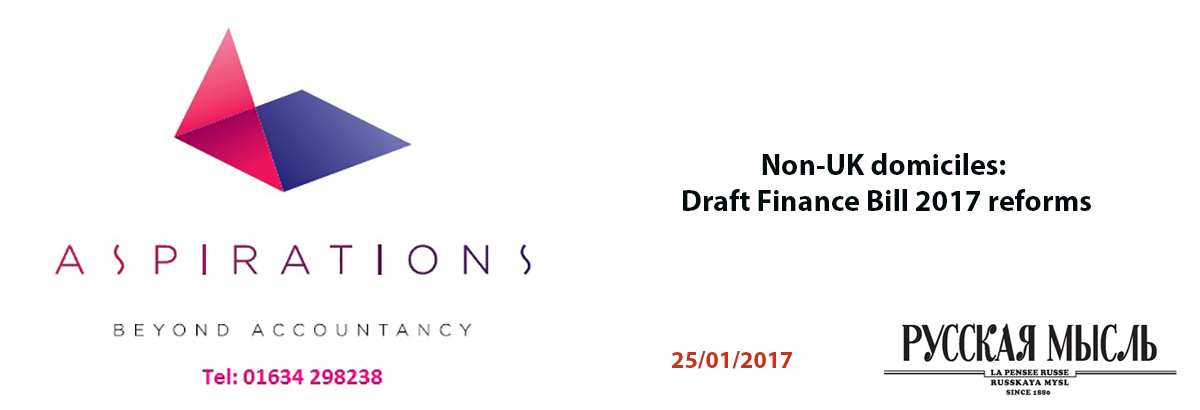Overview
With effect from 6 April 2017 UK resident non doms who are either long term residents, or have a “strong connection” with the UK by virtue of being born in the UK and having a domicile of origin here will become “deemed domiciled” for all tax purposes.
It’s essential that if you are domiciled outside the UK, but have been living here (resident) for more than 13 years action is required to assess how the new regulations will impact your tax position.
So what is changing?
- 1. Non doms who have been UK resident in 15 of the previous 20 tax years (“long term deemed doms”) will be treated as UK domiciled for all tax purposes.
- 2. The period of non-UK residence required to lose deemed UK domicile status for inheritance tax (IHT) has been shortened to three full tax years.
- 3. The availability of the remittance basis will be available to temporary non-residents in the year of their return to the UK, in respect of proceeds of gains realised in the non-resident period.
Transitional reliefs available
Capital gains tax – April 2017 asset value rebasing.
You hold outside the UK will have the opportunity of revaluing those assets to the market value as at 6 April 2017 if you meet the new criteria.
This relief will to apply automatically, but you can apply to have the rebasing dis-applied for specific disposals where the asset value at 5 April 2017 is less than the original acquisition cost. This allows the taxpayer to choose the most favourable treatment.
Mixed funds
Mixed funds consist of any mixture of capital, income and gains, these represent a real issue. To prevent the general rule of having remitted income being taxed at the highest rate of tax, Non Doms will have a period of two years to “cleanse” these mixed funds.
In preparation for this change, anyone who will be treated as a deemed dom from 6 April 2017 and have mixed funds and capital assets should be calculating and gathering documentary evidence to make arrangements to take advantage of the changes.
Offshore trusts
The new regulations have introduced many changes in the tax treatment of trusts, the main areas to highlight are: –
Capital Gains Tax, from 6 April 2017 settlors and beneficiaries will generally be taxed on the trust gains when benefits are actually received. However if new property is added this potentially favourable treatment can be lost unless the new property introduced meets the new criteria.
The tax treatment will change for all offshore trusts where the settlor is not taxed immediately on trust gains. Where payments are made to a close family member of a UK resident settlor, separate provisions will be applicable, apart from these circumstances a payment to a non-resident beneficiary cannot be matched against a trust gain. Where a settlor does become taxable they will be able to recover the tax paid without further tax consequences.
Exceptions will be introduced for temporary non-residents.
New anti-avoidance rule have been proposed to catch arrangements where a capital payment is made to a beneficiary that is not a close family member or the settlor is not a UK resident, but within three years a gift is subsequently made to a UK resident beneficiary.
Finally, another anti-avoidance provision starting on 6 April 2017 will prevent gains made when the beneficiary is not a UK resident being matched with payments to the beneficiary when they were a UK resident.
UK residential property – Inheritance Tax Provision
The value of residential properties in a close company or partnership will not qualify as “excluded property”. Debts relating to such property can be treated as deductible, even when the loan is from a connected party, but the loans are deemed to be spread across all assets of the company or partnership, even if secured only on the property.
When such residential property has been sold or a loan has been repaid then the property from such sale or repayment will continue to be non-excluded property for a further two years.
Targeted anti-avoidance rules will be introduced to disregard any arrangements undertaken wholly or mainly to avoid the charge. Also the draft legislation includes a provision which prevents a double tax treaty from mitigating the IHT charge outlined above.
Next steps
We recommend that anyone that is currently treated as non-domiciled or will be treated as deemed domiciled after the 6th April 2017 should be reviewing their current capital and income producing assets and what the impact of the these proposed changes .
We have tax specialists on hand to assist with advising clients about the effect of the proposed legislation and its impact. We also work with a number of professional partners to improve the position of non doms wishing to protect their income and capital.
Tony Kensington
Director
Aspirations Accountancy Limited
T 01634 298238
E tk@aspirationsaccountancy.co.uk




